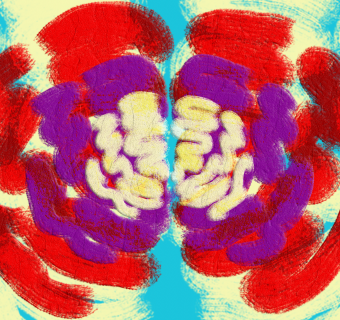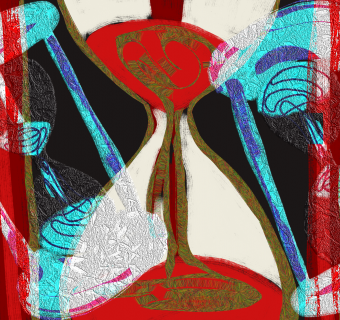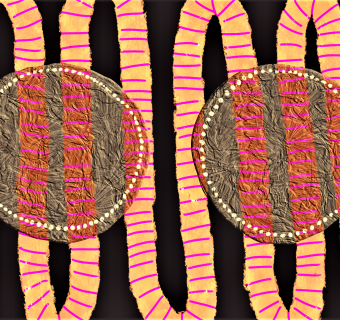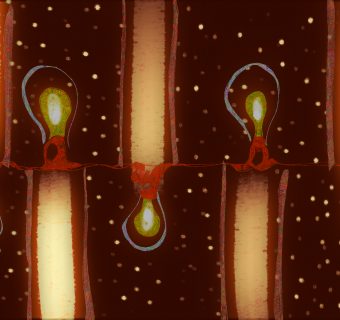After watching the Oscar-winning movie Everything, Everywhere, All at Once, I was intrigued by how the characters were able to jump through dimensions and experience different realities based on the choices they made. What’s more, all the realities experienced in these dimensions were happening at the exact same time. This made me ponder what time actually is, what it is made of, and how it defines our everyday lives and perceptions of reality. To discover the answers to my questions, I interviewed Dr. Ross P. Cameron, a professor in UVA’s philosophy department and director of the undergraduate program, and Dr. David Nichols, assistant professor in UVA’s physics department. Professor Cameron’s research interests surround metaphysics, the nature of time, reality, and logic. Professor Nichols’ research interests surround theoretical astrophysics, gravitational waves, and dark matter.
*The following responses have been edited for length and clarity*
Middleton: What is your definition of time? Do you view time as simply minutes, hours, months, and years (as most people do), or do you think it is more complex?
Cameron: [It’s] more complex…I don't have a definition of time, I don't really think we can define it in any kind of useful way. If you think of the sort of conception of time we get from contemporary physics is that it's just another dimension, it's just like, length, or width or depth, right? It's just another axis on which you can move. And a lot of philosophers agree with that, and develop philosophical positions based on that kind of idea that physics suggests. And I very much don't. I think time is different from space. It behaves differently. It's important to us in a way that space isn't in, space is important, but it's important in different ways. So I think…it [is its] special own thing.
Time then is…how we determine how things evolve towards the future, time is how things change. So…I tend to think of time…in relation to change.
Nichols: In the mathematical sense, it's just a model…which says how things evolve. In physics, we're usually interested in taking information now and trying to predict what happens in the future. Time then is…how we determine how things evolve towards the future, time is how things change. So…I tend to think of time…in relation to change. And then, you know, physicists noticed some interesting properties of time, which is that it doesn't actually seem to be independent of how people move. So it used to be back in the days of Newton, in the 17th century,...that people thought time was universal, everyone experienced the same time. People realized…that time and space are actually interconnected. The consequence of this is that time is relative. How we experience it is one thing…how it appears in the laws of nature is very different.
Middleton: By that definition, is time different than space or is it the same?
Nichols: I'm not saying that time and space are the same thing, I'm just saying they are one four dimensional thing, as opposed to three dimensional space. Space and time are experienced in very different ways, [but] they're…interconnected in a way that was not known in the days of Newton.
Middleton: Do you think time is man-made or do you think it just comes with the universe in general?
I think time itself has nothing to do with us. It was there before us, it will be there afterwards. We find ourselves in it, we don't make it
Cameron: Something that just comes with the universe in general. We make measurements of time. Hours…minutes and seconds, I think that stuff is kind of arbitrary. There's no sort of, like special unit, like special measurement out there to be discovered or anything like that. I think time itself has nothing to do with us. It was there before us, it will be there afterwards. We find ourselves in it, we don't make it.
Middleton: Since time is something so much broader than our understanding of it in terms of minutes etc., do you think that time started when humans started? Or do you think that it's something that started with the universe and can be used to measure things that were happening before the universe?
Nichols: I definitely agree that time existed before humans were around to measure it. Whether time existed before…the Big Bang, before our universe came into existence, that's a little harder to answer. The current thinking is that the universe itself is infinite. And what we can see is just a small patch of…some larger universe. It's very likely that there was something around…before even our little pocket of the universe came to exist, that it didn't come out of nothing.
Middleton: So, in terms of our existence, do you think that time is more or less important than space in terms of how we experience reality?
Nichols: I think it'd be hard to…think of space without time or time without space. I think they are intimately connected in our experience of things. In terms of what we experienced it's very hard to think of space without time or time without space. Although they're obviously quite different…concepts. There is a flow of time that can't be reversed. And there's…freedom to move in any spatial dimension. There's notions of time related to entropy here increasing disorder in systems as well, that's another kind of fundamental notion of time. (Professor Nichols described that entropy is essentially the disorder of a system or collection of matter. It is natural for a system to progress towards more disorder/chaos because it takes less effort for atoms to be disordered. For example, it takes less effort for atoms to simply move freely rather than being forced to stay in a particular place).
Middleton: How does time relate to disorder and entropy?
If you have a glass on your table, and you knock it off, it shatters into 1000 pieces, but you never see the opposite happening. You never see 1000 shattered pieces of glass coalescing into a coherent cup.
Nichols: You can make a mathematical definition of how much disorder…or entropy there is. In the laws of physics, there's an increasing tendency towards disorder. There are some physicists who like to think about time in terms [of]…irreversibility…, the fact that things tend to get more disordered. If you have a glass on your table, and you knock it off, it shatters into 1000 pieces, but you never see the opposite happening. You never see 1000 shattered pieces of glass coalescing into a coherent cup. So some people then ultimately think that this notion of going from…less disordered to more disordered is fundamental to the nature of time.
Middleton: We talked about how time is related to our reality and related to entropy. In a general sense, what is time made of?
Nichols: In the entropic picture, that's hard to answer. But in terms of Einstein's relativity…there is this four dimensional continuum of space and time…it's one unified thing. And what's interesting about Einstein's relativity is that…space and time actually get distorted by the presence of massive objects. In relativity, the way of thinking about how the Earth goes around the sun is that the sun actually distorts space and time around it. And then the earth is essentially following the shortest path in this distorted space. So people usually use an analogy that if you had a trampoline, and you put a bowling ball on it, then…the bowling ball would cause this trampoline to stretch, and space would no longer just be flat, it would be curved. And if you tried to…take a smaller ball…and roll it around on the surface of the trampoline, it wouldn't go on a straight path…, it would go in orbit around the bowling ball. Ultimately…there is some fabric of space and time, which is something that's [dynamic] and changes. But what Einstein couldn't answer is, what exactly is this? There is this observation…that the gravitational force is a distortion of space and time.
Middleton: How is increasing entropy and the way it is intertwined with time important to the universe in general? Is entropy a way of maintaining balance in the universe? Why does that tend to happen? Does that have some sort of significance?
Nichols: Our universe is expanding…at an ever increasing rate. So, you know, then one potential outcome of this is…as time goes on…nearby galaxies get further and further away. Everything gets so spaced out, you know, [if] time were to progress forever, that the universe [would be] in sort of this maximally entropic state that…you lose most structure. The end state of the universe…[could] be a state of…very high entropy, of very high disorder, and you [would] lose all the structure, like all the galaxies and clusters of galaxies that are actually seen in…the universe as we look out through telescopes.
Middleton: Is the way that we conceptualize time constraining at all, or do you think that it's more helpful in a way of standardizing things for us?
It can't not be because, ultimately, we are tied into the day, which is imposed upon us by our trip around the sun. What might humans have been like had we not been tied into that day?
Cameron: Honestly both. We shouldn't ignore the fact that our system for representing time is amazing, in many ways. We can tell time super…accurately, so that's a real scientific advance. So in that sense it is freeing. It's amazing that we can coordinate time with people in other countries. We can send astronauts up to the moon and coordinate time with them. On the other hand, is it constraining as well? It can't not be because, ultimately, we are tied into the day, which is imposed upon us by our trip around the sun. What might humans have been like had we not been tied into that day? It's explored in all that science fiction, what might life be like, if we lived [on] other planets or space stations or something that… we [would be] completely different, we could have evolved completely differently. There's something [that is] both constraining and also amazing.
Middleton: How do you think that time ties into our human perception of existence? Do you think this would be different if we didn’t have our current understanding of time?
Cameron: [There] seems to be this…asymmetry between the past and the future. Some philosophers think that's just an illusion…just a reflection of our causal influence or [how] things to happen in the future, [but] we can't cause things to happen in the past. I think it's more than that. I think that that's central to our…lives and our experience of the world: you can really regret things in the past because you can't change 'em, you anticipate things or hope for things for the future, because you have agency there you can bring about even things that you can't control, you can still hope that they go one way or another. So you're…tied into that thought that the future is not settled. It's still there to be made.
Nichols: If you didn't have a notion of time…would biological organisms like ourselves…still have a normal life span? If we imagined that we just didn't have a notion of time…like a fruit fly [who’s] memory lasts less than a second, constantly experiencing what is happening at the moment without past or present…that'd be a very different experience. In practice…memory is so important. There's a lot of discussion about how you should live in the moment. But you know, that doesn't always work. So well, in practice, it's your life that is hard to escape. It's hard to imagine any real notion of learning…if you actually didn't have a notion of time. If you have nothing to base prior knowledge off of, essentially, you're just determining your existence by reacting, what occurs to you [in] the present. But that's a different can of worms, I guess people say.
Cameron: It's such a central thing to our lives that I don't know what it would mean, to live a life in non temporal terms, to…live a life without thinking of it in terms of one thing after the other. Like, how could you ever have a project if you didn't plan for the future? How could you ever grow as a person if you didn't learn from the past? I don't think there's any other option for us.









